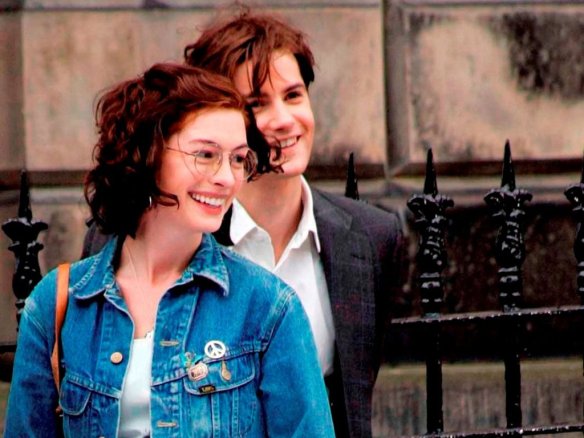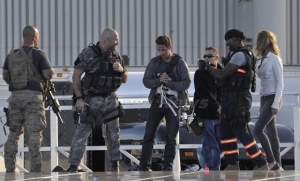The cleverness of this story is that it takes place on a single day, July 15, over several years. It charts the relationship between Emma Morely (Anne Hathaway) and Dexter Mayhew (Jim Sturgess) as they grow from twenty-somethings to forty-somethings, try to figure out what to do with their lives, and wonder if they will end up together or not. It’s based on the book of the same name by David Nichols.
I didn’t really care for the book, so I wasn’t surprised that I didn’t really love the movie, either. It’s not a terrible film or an awful story, it’s just that I don’t really like the characters, and I don’t really care whether Emma and Dexter are happy or not because I think they’re both kind of selfish and immature jerks. The movie adaptation made them slightly more likeable by omitting some of the less-than-flattering storylines, but it’s still a story about two people who may or may not get together. Who cares? If that’s the way you want to spend a Saturday afternoon, fine, it won’t hurt you, but there’s really nothing very compelling, thought-provoking, or insightful here.
At one point, Dexter’s sickly mother tells her son,
“I know that you’re going to be a good person, kind, loving, good…but I don’t think you’re there yet. And I worry that you’re not very nice anymore.”
She’s right. At this point in his life Dexter is hosting a cheesy late-night television show, partying and drinking every night. He does, eventually, grow up and become a ‘good person’, more responsible at least, less of a drunken mess. But it isn’t because he’s striving for any particular standard or facing and actively overcoming his shortcomings, it’s just because he gets…older. How utterly uninspiring.
Maybe some people find this story incredibly romantic, that two people who have been “just friends” for years but always carried a flame for each other might one day get together at last. But I just found it annoying. Dexter is a pig, admitting:
“I do fancy you. The problem is I pretty much fancy everyone!”
This come shortly after he makes fun of her modesty, when she is reluctant to skinny dip with him.
“You’re such a prude! Why are you such a prude?”
What a guy. Emma, for some reason, continues to hold out hope. At first I sympathized with her, but after a while I wanted to shake her and ask why she insisted on pining over this guy who is clearly not worth it for so many years. I get that you can’t always help who you like. I get that she had feelings for him and they kinda-sorta dated once. I don’t get why I’m supposed to think it’s a good idea to keep clinging to memories and dreams from the past, over a guy no less, instead of moving on. Do I sound like I’m not a romantic? I’m sorry, I think there’s a place for romance, but I’m pretty sure we serve a God who asks that we not let our passions rule our lives. At least find something constructive to do instead of sitting around feeling sorry for yourself.
This story can’t even be used as an example of Romans 8:28, which says “And we know that in all things God works for the good…” because the rest of the verse continues “…of those who love him, who have been called according to His purpose.” There’s no purpose-ing going on in these jokers’ lives at all, much less God’s. They’re not even “waiting” for each other, they each get involved with other people that they don’t really like as much because…who knows. Because they can’t be bothered to hold out? Because it isn’t a movie about self-control or striving for anything?
Maybe I’m being too hard on this movie. I’ll end with a semi-positive, but it’s a spoiler, so don’t read past this picture if you don’t want to know how it ends..
***SPOILER ALERT*** After Emma dies, Dexter and his widower father share the following exchange:
“I don’t want a heart-to-heart, do you? Except to say, that I think the best thing that you could do, would be to try to live your life as if Emma were still here.”–Dad
“ I don’t think I can.”–Dexter
“‘Course you can. What do you think I’ve been doing for the past 10 years?”—Dad
I guess in a way that’s similar to the way that Christians should be living out their lives aware of an invisible presence, always trying to do what God wants us to even if it doesn’t always seem like he’s tangibly “here”. ***END SPOILER***
It’s not terrible, but it’s annoying enough that watching this movie was One Day of my life that I won’t be reliving.





